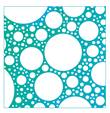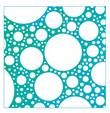|
|
Australasian Colloid and Interface Society Web: colloids-ausnz.au; E-mail: acis.enquiries@gmail.com; LinkedIn |
|
ACIS Newsletter – Issue 32, March 2023
Welcome
Dear Esteemed Members,
Welcome to our 32nd issue of ACIS News! We produce a quarterly newsletter - sent around in February, May, August, and November (approximately) - to keep the wonderful members of ACIS informed of our initiatives and for members to directly communicate with our Society. We publish job announcements, meetings of interests to our society, career development opportunities, any exciting research that you would like to share with us and much more. To everyone up to date with the on-goings in our colloids society, please send your suggestions and items for the next newsletter to christine.browne@monash.edu or Stuart Brown at s3399895@student.rmit.edu.au.
President’s Corner
Welcome to our new board for ACIS! I look forward to being the new President and working with the Colloid and Interface community in Australia and New Zealand. A massive thankyou to Erica Wanless for her great leadership as President during the last couple of years, and to Deb Wakeham as our very effective past treasurer.
For those who don’t know me, I am a Professor in Physics at RMIT. I have been at RMIT for nearly 10 years, and prior to that was at CSIRO for nearly 10 years. My research is largely focused on understanding solvent interactions, and currently I am working towards developing ionic liquids as solvents for biomolecules. I have attended many ACIS and student conferences and enjoy being part of our great community.
I am keen to run new events, and the board and I are open to ideas, so please reach out if you have suggestions. We also have the ACIS conference in preparation for 2024, and a big thanks to Erica Wanless for chairing the conference!
Tamar Greaves (President)
News
Board for 2023
We would like to welcome both Maggie Zhai from RMIT and Marta Krasowska from University of South Australia to the ACIS Board of Directors for the period 2023-2025. Both have been long-time supporters and members of the community. The continuing director portfolios are as follows: Tam Greaves is our President, Geoff Willmott our Vice President with Maggie Zhai filling the role as our Honorary Treasurer. Michael Higgins will continue as our Membership officer and Christine Browne as the Communications officer. Frank Sainsbury will continue as the Equity office and Joe Berry chairs the Awards subcommittee.
We would also like to send a big thank you to Grant Webber who is stepping down as our Honorary Secretary. We welcome Andrew Clulow from the Australian Synchrotron who is taking on this role.
Maggie Zhai:
I am a Senior Research Fellow within Applied Chemistry at RMIT University. I completed a PhD in 2012 at Monash University working on protein structural behaviour at the oil-water interface using synchrotron radiation circular dichroism. I then worked for 2.5 years at CSIRO as a Postdoc. My research interests focus on understanding amphiphile self-assembly, lamellar-inverse structural transition, development of self-assembled lipid nanocarriers for the delivery of therapeutics, and characterisation of nanoparticle-cell interactions. Recently, I’m particularly interested in applying synchrotron SAXS/bioSAXS to study the self-assembled structural dynamics of lipids upon RNA complexation and endosomal acidification. I am also an ANSTO Australian Synchrotron User Advisory Committee (UAC) member since 2022.
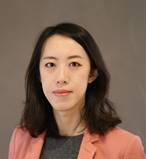 |
The 34th Australian Colloid and Surface Science Student Conference (ACSSSC34)
The 34th Australian Colloid and Surface Science Student Conference (ACSSSC34) was held from the 31st of Jan - 3rd of February, 2023 in Melbourne. The event was jointly organised by RMIT University (Dr. Aaron Elbourne, Dr. Saffron Bryant, and Prof. Tamar Greaves), The University of Melbourne (Dr. Joe Berry, Dr. Casey Thomas), UniSA (Prof. Marta Krasowska), and Monash University (Dr. Christine Browne). The conference was headlined by three fantastic plenary speakers, Dr. Xuan Wu (UniSA), Dr. Paul Joyce (UniSA), and Prof. Patrick Spicer (UNSW) and attended by 140 delegates from over 21 domestic and international institutions. It was a fantastic event, both for scientific presentations and social events. The high calibre of Australian and international science presented at the conference was inspiring to all that attended.
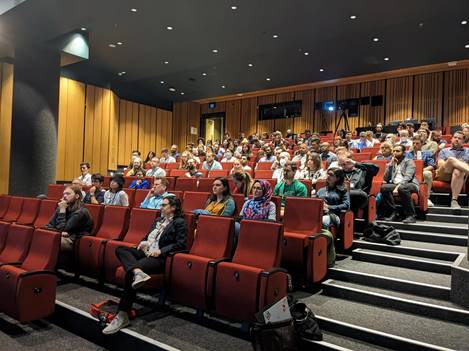 |
||||||
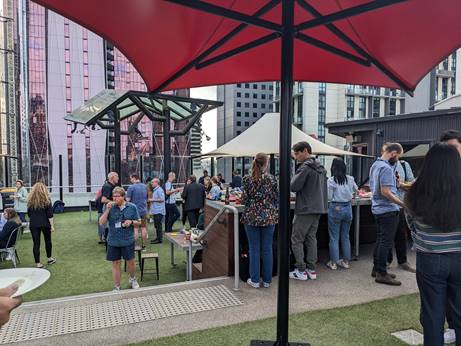 |
||||||
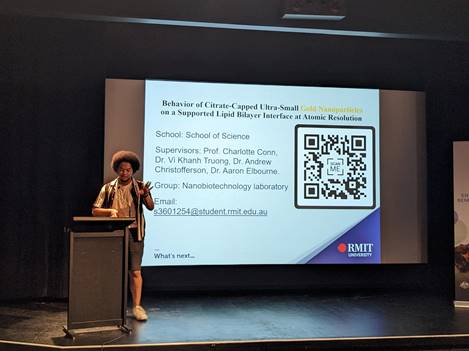 |
||||||
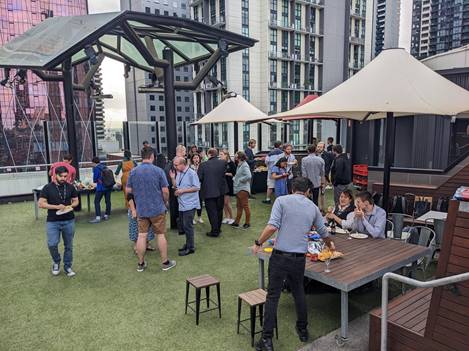 |
||||||
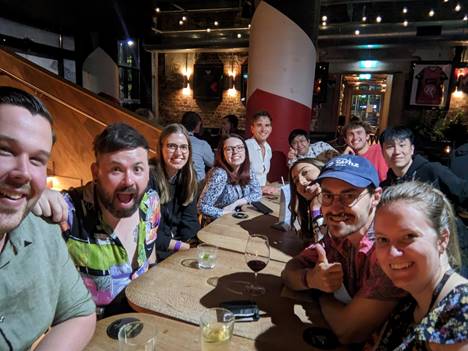 |
||||||
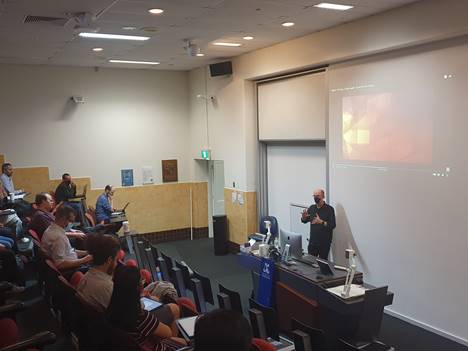 |
||||||
Call for Themes ACIS 2024
ACIS 2024 will be held in early Feb 2024. Exact dates to be confirmed, most likely in Wollongong NSW. The Committee invites expressions of interest in Chairing themes for ACIS 2024. The ACIS symposium is structured on themes based on common scientific or technological subjects in the areas of colloids, surfaces and interfaces, with about 5-7 themes over the symposium, and as many as three themes running in parallel.
This is an opportunity to affect the direction of the symposium and showcase the research areas you are passionate about! Theme chairs (2 to 4 persons per theme) need to prepare a title and description of the theme up to 150 words, propose keynote speaker/s for the theme, and propose the sponsorship stream to cover the keynote speaker costs. Sponsorship of $4,000 per keynote speaker is required. (Please note: $2,000 of this will go to the speaker for travel and accommodation expenses, the remainder covers their complimentary registration, social event tickets, and general symposium expenses). Please do not engage companies about sponsorship UNTIL the themes are decided and we have discussed this as a group – this has made life very difficult in the past. You would also be free to allocate ‘invited speaker’ status to other speakers if you wish, but they would not be provided any funding from the symposium itself, in line with current practice across most Australian conferences.
In organising a Theme you/your team is responsible for upholding the equity policy of ACIS about the gender and geographical distribution of the keynote speakers and organising committee, as described in the policy online. Each theme leader will need to indicate efforts made to achieve a balanced gender representation among their invited and contributed talks. In addition, you/your team is responsible for meeting the financial requirement described above, for organising the programming and completing abstract screening within the time frames determined by the Committee and managing the gathering of keynote speaker biographies/photos etc. as requested.
Please submit your theme proposal to the online form no later than 10 April 2023.
Technical committee co-chairs, George Franks and Stuart Prescott, gvfranks@unimelb.edu.au; s.prescott@unsw.edu.au
Call for nominations - 2024 ACIS Plenary Lecturer
Also at the 2024 Australian Colloid and Interface Symposium, ACIS will again be sponsoring the Australasian Colloid and Interface Society Plenary Lecture. The purpose of this 1-hour lecture will be to overview a body of work, which, in the opinion of the board of ACIS, represents an original and outstanding achievement in the area of colloid and interface science. The lecture is aimed to be complementary to the Alexander Lecture. The ACIS plenary lecture will be a significant international colloid scientist, with a demonstrable performance against the selection criteria, which are listed below.
The candidate must:
· Be a person of high scientific profile.
· Possess excellent presentation skills.
· Represent an area that would be of interest to a broad section of the Australasian Colloid and Interface Science community.
· Be approved by the board of the Australasian Colloid and Interface Society.
A list of the previous ACIS Lecturers can be found here.
Please also forward ACIS Plenary Lecturer nominations to our ACIS e-mail address acis.enquiries@gmail.com by the 10th of April 2023. Please include a short justification with your nomination. Based on the nominations received, the Board of ACIS will select the ACIS plenary lecturer at the subsequent board meeting.
A reminder that it is necessary
to check to see whether the nominee is available at the time of the ACIS
meeting, should they be selected. We ask that you provide this information with
your nomination. In addition, we would like to bring the ACIS equity guidelines
to your attention to aid you in identification of suitable nominees. They are
available on the ACIS website.
We hope that the successful nominees will contribute strongly to the ACIS
meeting so please bear this in mind also when nominating.
Finally a reminder that you need to be a financial member of ACIS to nominate
someone for the ACIS Plenary. You can become a member on our website https://acis.wildapricot.org/.
International Polymer Colloids Group Conference
The International Polymer Colloids Group is hosting a conference at Queen’s University in Kingston, Ontario, Canada. The conference runs from the 18th-23rd of June 2023 with a Graduate Research Seminar on the 17th and 18th of June. Follow the link below for more information:
https://ipcg.info/ipcg-conference-2023/
500 Queers in Science
Dr Khay Fong (Uni Newcastle) participated in the 500 Queers in Science event during world pride at the Botanic Gardens in Sydney only the 21st of February 2023. 500 Queer Scientists is an international visibility campaign for LGBTQ+ people working in the sciences, to show queer people currently working in science that there are others like them and to provide role models for future generations of researchers, and to create a database that can be used when planning events to ensure representation. Her short talk was about lipid self-assembly for on-demand drug delivery, where she demonstrated this colloidal concept by assembling humans as lipids in a vesicle and drug release with a confetti cannon. The panel discussed topics from cosmology and chemistry to navigating workplaces and finding allies.
Happy mardigras y’all!
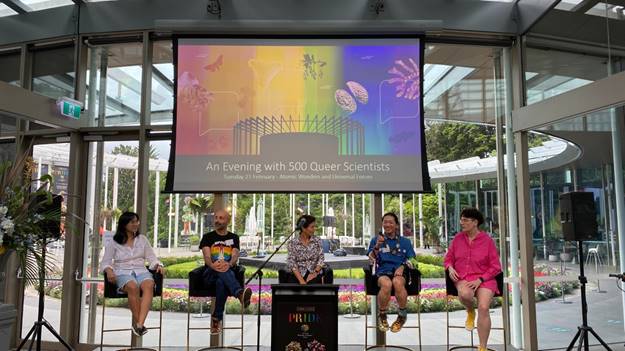 |
Awards
Student Conference Awards:
Healy-Hunter Award
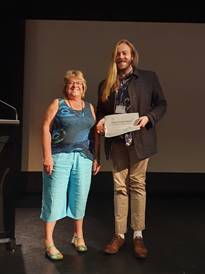 The Healy-Hunter award recognises the most outstanding oral
presentation at the conference by a student enrolled in a PhD > 2
years. Congratulations to this year’s winner Daniel Morris, from UNSW.
(Presented by Erica Wanless)
The Healy-Hunter award recognises the most outstanding oral
presentation at the conference by a student enrolled in a PhD > 2
years. Congratulations to this year’s winner Daniel Morris, from UNSW.
(Presented by Erica Wanless)
ACIS/ECIS Award
The ACIS/ECIS Award recognises the most outstanding oral presentation at the student conference, by a student who has been enrolled for no more than 2 years. Congratulations to this year’s winner Kaiwen Zhang, from RMIT.
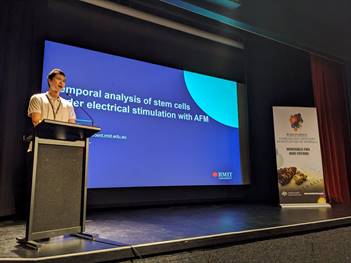 |
ACIS/ECIS Runners Up
Michael Hassett (Left) – RMIT & Lauren Lowe (Right) – UNSW (Presented by Joe Berry)
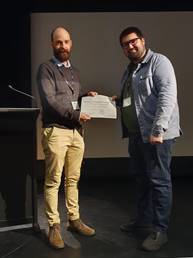 |
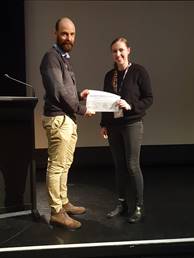 |
Outstanding Talks
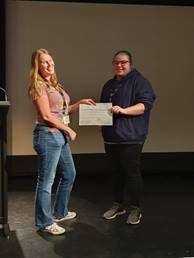 Hayden
Robertson (Left) – University of Newcastle & Zo Shaw (Middle) – RMIT & Regina de Medeiros (Right) – University of Melbourne (Presented by
Saffron Bryant)
Hayden
Robertson (Left) – University of Newcastle & Zo Shaw (Middle) – RMIT & Regina de Medeiros (Right) – University of Melbourne (Presented by
Saffron Bryant)
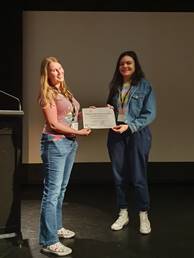
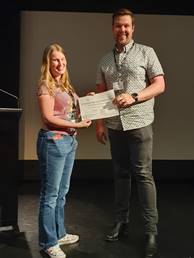
Poster winners
Xiaotian Wei (Not pictured here) – RMIT & Patrick Williams (Left) – University of South Australia & Sulokshana Marks (Right) – University of Wollongong (Presented by Saffron Bryant)
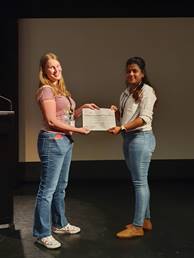 |
|||
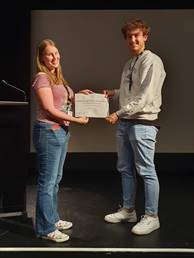 |
|||
Victoria Fellowship
We are excited to congratulate Dr Sampa Sarkar for the achievement of being awarded the prestigious Victoria Fellowship in physical science, 2022. Her research is targeted towards benefitting future vaccine research and treatment of infectious diseases (e.g. Tuberculosis). It will improve Victoria’s capabilities in biotechnology and vaccine development and lead to better vaccines. The below link is a news article highlighting this wonderful accomplishment:
https://www.theaustraliatoday.com.au/dr-sampa-sarkar-awarded-the-prestigious-victoria-fellowship/
Opportunities
Surface Wetting Machine Learning Algorithm
Attention all wetting scientists and engineers!
We are seeking experimental contact angle images which we can use to evaluate and benchmark our novel approach to contact angle analysis. This method utilises a machine learning model which is trained on solutions to the Young-Laplace equation, and we require a large number of experimental images to ensure our methods are robust and applicable to practical measurements. With a large enough dataset, this method will be more accurate, autonomous, faster, and more robust than existing methods.
We are looking for a wide range of angles, opaque/reflective surfaces and liquids, and smooth/rough surfaces. While current work is restricted to static sessile drop measurement, future work will focus on dynamic measurement and so dynamic measurement data is also welcome. If you have any particularly difficult systems which conventional fitting methods struggle with, these would be particularly useful.
Images can be submitted either using the following google form (https://go.unimelb.edu.au/i9je) or by emailing Daniel Shaw at shaw.d@student.unimelb.edu.au. The google form asks for information on the liquid and surface in the image, however, these can be de-identified if the surfaces or liquids are confidential.
With thanks,
Daniel Shaw, University of Melbourne (2nd year PhD student, supervised by Dr Joe Berry)
Networking
Networking and building connections with collaborators are an enormous part of successful research. Here are a few fantastic groups that might interest you for your next networking opportunity:
STEM Sisters
STEM Sisters is home to a diverse group of culturally and linguistically diverse women committed to an intersectional approach for empowering women of colour in Science, Technology, Engineering, and Mathematics fields. They also publish a quarterly digital publication entitled “MAGNIFY- WOC IN STEM” which featured our very own Dr Sampa Sarka recently. Follow this link for more information: STEM Sisters
 |
Wilam
Wilam is a new online community network that connects everyone across the life sciences industry, including manufacturers, service providers and researchers. Join over 6,500 account holders on Wilam and post events on the events calendar, engage on discussion boards and community groups, and find and be found by others here.
Wilam is free to join. Sign up at www.wilam.com, log in and start networking with like minds.
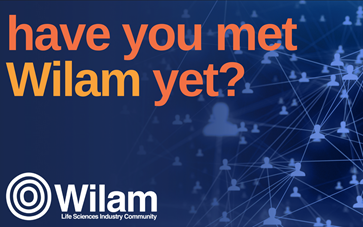
 Advertisement
Advertisement
Attension Theta Topography: Evaluate the Influence of Roughness to Wettability
The Attension Theta Topography makes it possible to combine 3D surface roughness measurements in conjunction with contact angle measurements and to perform those measurements on the same exact sample location. Intuitive software automatically calculates roughness corrected contact angle and surface free energy. The fully automatic measurement takes only a few seconds and separates the impact of surface chemistry and roughness of various coating formulations and surface modifications.
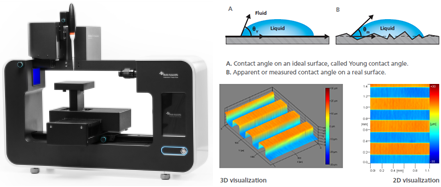 |
|||
Activities
Join our Awards, Communications, Conferences and Events Committees
ACIS needs its members to be actively engaged. Please let us know if you would like to be involved in the committees that will run the activities of the Society: Awards; Communications; Conferences and Events. Or if you would like to propose other activities we should be running. We especially invite students and early-career researchers to become involved. Please email your interest to acis.enquiries@gmail.com.
Visiting Scientist Register
Are you planning to host a visit by an outstanding scientist in the colloid and interface field? Why not let ACIS members know about the visit? We aim to keep track of visiting scientists, to facilitate their introduction to the Australasian scientific community. Please email details of the visit to acis.enquiries@gmail.com.
ACIS Membership
Please encourage your colleagues, students and industrial partners working in the field of colloids and interface to join us. General membership is $100 per annum. The membership year is from 1st March each year. Memberships paid after this date are valid until 28th February of the following year. More information is available on our website https://www.colloids-ausnz.au/.
 Use Our LinkedIn
Group to Tell People Your News
Use Our LinkedIn
Group to Tell People Your News
ACIS is now present on LinkedIn. Please join our LinkedIn group and post discussion items on job ads, conference calls, and interesting facts about the wonderful world of colloid and surface science.
 Or Tag your Friends and Colleagues
Or Tag your Friends and Colleagues
Share your next big breakthrough, job opportunity or beautiful science with the ACIS community by using twitter.com/colloids_AusNZ.
The Newsletter team signing off,
![]()
Christine Browne – christine.browne@monash.edu
![]()
Stuart Brown – s3399895@student.rmit.edu.au
